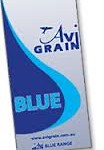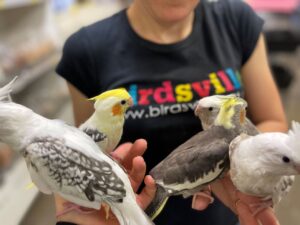Keeping Cockatiels for first time owners
Bringing your Baby cockatiel home for the first time
Minimize stress– do not play with your cockatiel for the first 4 days and let him or her get used to the new surroundings. We recommend
Treat with sulphadim– for the first 5 days of bringing your baby bird home this is to stop added stress that a baby bird
Worming– Do not worm a baby cockatiel until they are 12 weeks old or atleast 2 weeks after relocating them to a new home.
Lice and mite spray– spray every 3 months this can be sprayed a week after relocation.
Diet for a baby cockatiel
When bringing a brand new recently weaned baby cockatiel home the most important thing you provide is fresh food and water. Often the bird will be stressed for the first couple of days acclimatising to the new surroundings, this can result in them going food off a couple of days. The most imperative thing you can do with your baby cockatiel is give them a good quality seed mix. Sadly I’ve i have encountered baby birds starving to death because the new owner has placed the wrong seed or simply a low grade seed mix into the cage where the baby bird has to soft through the filler seed in order to find its nutrition. When a baby bird has a low grade seed mix and they find it difficult to get enough nutrition of quality grain this will result in the baby bird reverting to a younger state of mind, Which ive always called a birds sooky state which is what baby birds do to beg for food from their parents. An adult bird can survive on a poor grade of cockatiel mix but i would not recommend feeding this to any bird unless there is no other food available…. emergency food.
Diet for Cockatiels
Seed– Feed your newly acquired cockatiel a good quality seed mix if you are unsure of the seed mix ask a bird expert. Also feed your baby cockatiel greens such as snow peas, spinach, broccoli, beans, egg and biscuit mix, arrowroot biscuits., carrots, lebanese cucumber.
Sprouted seed– use a cockatoo seed mix for your sprouting seed mix.
Millet sprays– are excellent for baby cockatiels, this grass seed is great for its freshness and it encourages baby birds to eat as much as possible. Both Pannicum and french white are great for baby and adult cockatiels.
Grit– which is a mix of egg shells,sand, lime stone, charcoal, and cuttlebone which is rich in phosphates and calcium should be supplied to your birds in a separate container not in the seed. This should be available to your bird regularly. Other less effective ways of supplying calcium is with cuttlebone or calcium bells.
Water– There water should always be clean and fresh.
Vitamin supplements – An important addition of vitamins and minerals to your birds diet. This should only be added to the water to ensure your bird actually consumes it. Vitamins added to seed is rendered useless as when a bird eats they shell the seed and are very particular with what they eat.
The good oil – Available in store packed with Liquid Omega 3 and 6 supplement for not only improving the health of cockatiels in general and their eggs it can help with fatty liver disease. Omega 3 and 6 can be deficient in many grains and this can help repair the liver, egg production and immunity. The good oil also contains fat – soluble vitamins including A, D3 and E. Easy to use mix 15ml of the good oil per kg of seed. Let mix stand for at least 4 hours at room temperature before feeding to ensure the oil leaks into the kernel of the seed.
Feeding your pet Cockatiel pellets or seed? the big debate
All our cockatiels are fed seed especially baby cockatiels. If you choose to feed your bird pellets this has to be done carefully as most birds prefer seed and may refuse to eat the pellets if you change them from seed to pellets too quickly. Most breeders recommend pellets, some vets recommend pellets only, others recommend seed only. I recommend seed but pellets are a good addition to there diet. I believe giving your bird variety is the best possible way to keep your birds healthy.
Toxic food for Cockatiels
These foods are either poisonous to cockatiels or can make them sick.
chocolate, avocado, lettuce, cherries, peaches, onion and cocoa beans.
The cage and it’s environment for a baby Cockatiel
A suitable cage in imperative. The very very smallest cage id place a baby cockatiel would be 18 inches by 18 inches. Any cage smaller is unacceptable and you should consider getting a smaller bird such as a budgie or canary. All too often i come across bird owners with birds being kept in cages the wrong size or the wrong design for the bird. Surprisingly these people wonder why there bird is aggressive i call it cage rage which is easily avoided by providing the correct environment for your bird to keep them happy and healthy. Affectionate birds are this way for a reason they have been cared for properly. Remember birds do not walk up and down they walk side to side or perches. Ask us at Birdsville if you are unsure of the cage you have.
Enrichment for inside the Cockatiels cage.
Birds like somewhere to sleep and snuggle which is why we recommend all cockatiels have a birdy tent which is available in store. they also need to be provided with a variety of toys. Be selective with your toys and choose variety as it is pointless in placing 2 of the same toy in the cage. birds love different textures toys that make noises and different textures such as plastic, wood, leather etc. Birds that are not given an environment with stimulation end up with high aggression which means become serial biters and often end up with psychological issues. It is much easier and more cost effective to avoid feather plucking than to fix it as it is often incurable.
Is my Cockatiel Healthy and settling in well
Watch your baby bird’s droppings baby Birds that become stressed can get diarrhea. Many people are unsure what diarrhea looks like or what to look for. If your birds droppings look watery with no firm dark and white part this is likely to be the runs. Do not stress as this is very common but should be treated with Sulfa 3 or sulphadim. This is added to the water easily with instructions on the bottle. Because stress can cause diarrhea i recommend when anyone purchases any new bird for them to treat the bird with sulfa 3 or sulphadim for the first 5 days of taking any bird home.



